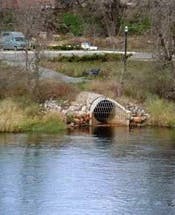Storm water and drought-related projects in Winston-Salem, Yadkinville and Wilkes County got a boost yesterday when the U.S. House of Representatives voted to override President Bush’s veto of a $23 billion water-resources and conservation bill.
If the Senate does the same, it would be the first time that Congress overrides a Bush veto. The Senate, which voted 81-12 in September in favor of the bill, is expected to take up the matter soon.
The bill would provide $3 million for storm water projects in Winston-Salem and would require the Army Corps of Engineers to do feasibility studies in Yadkinville and Wilkes County for possible water-supply projects. Officials say that such studies are a key step in getting a project eligible for federal money.
U.S. Rep. Virginia Foxx, a Republican whose 5th Congressional District includes those three local governments, was part of a small minority of legislators who voted against the override. The vote was 361-54.
Foxx, citing concerns similar to those expressed by Bush when he vetoed the bill Friday, said through her press secretary that $23 billion was too much of an increase from the $15 billion spending bill that she had supported earlier.
“This bill is a perfect example of how Congress needs to learn some fiscal responsibility. A $15 billion bill magically turned into a $23 billion bill - only in Washington. That $8 billion difference is a lot of money in the eyes of taxpayers,” Foxx said in a press release.
Foxx’s vote put her on the fringes of her party, as only 15% of the 415 votes supported Bush’s veto. Foxx’s call for fiscal responsibility put her in a position of opposing projects and studies in her own district at a time when, local officials say, drought conditions make such projects even more urgent.
In North Carolina, the bill would provide more than $70 million for water-resource and conservation projects. Wilkes County, for example, would like to change the spots in the Yadkin River from which the towns of Wilkesboro and North Wilkesboro pull water.
Low water levels caused by drought conditions make water more turbid - and more expensive to treat - because it has to be pulled from the bottom of the river. To pull cleaner water, the county would like to move the intake valves to the W. Kerr Scott Reservoir.
Source: Winston-Salem Journal


